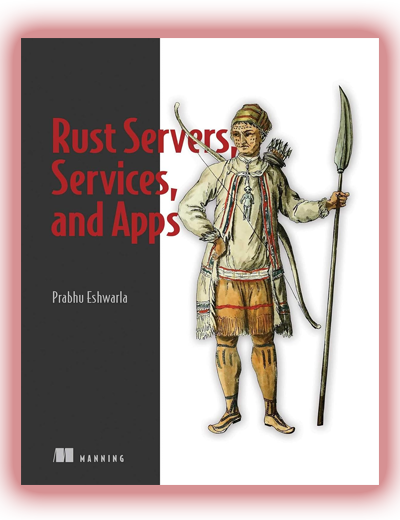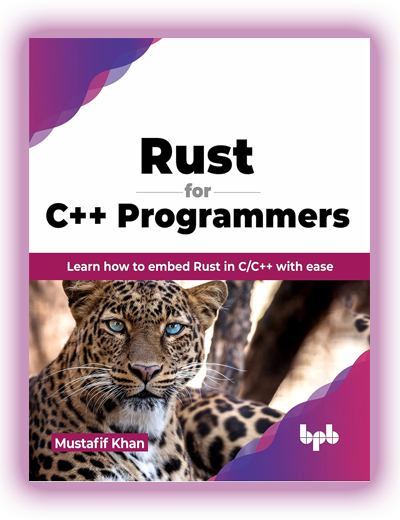“Rust for Network Programming and Automation” by Gilbert Stew is a hands-on guide to building network solutions and automation systems using Rust. This programming language is increasingly chosen for tasks where performance, safety, and memory control are critical — all of which are central in network engineering and infrastructure automation.
The author explains how to use Rust to develop CLI tools, network clients and servers, REST APIs, proxies, scanners, and backends. The key strength of this manual lies in its real-world focus: from asynchronous code and TCP/UDP handling to working with APIs, SSH, SNMP, and infrastructure automation.
Download “Rust for Network Programming and Automation” if you're ready to move beyond scripting and embrace type-safe, maintainable, and high-performance systems. From the very first chapters, you'll build a TCP server, a REST client, an SSH automation tool, or a monitoring service — all in Rust, with the performance of C++ and the safety of Java.
Why Is This Guide Worth Reading?
- Rust offers a unique combination: low-level control with compile-time safety — critical in networking applications.
- This guide is not just an intro to Rust: it's a project-based exploration of tools that are essential for modern infrastructure development and support.
- Learn to use libraries like: tokio, hyper, reqwest, serde, ssh2, and snmp-parser.
- Create utilities for monitoring, API testing, networking diagnostics, SSH automation, and more.
- Concepts like async, multithreading, serialization, and connection management are fully covered.
Each example comes with step-by-step explanations and real scenarios, making the handbook especially valuable for DevOps, system administrators, and Rust developers.
Who Should Read “Rust for Network Programming and Automation”?
This guide is tailored for professionals working at the intersection of development and operations:
- CLI developers: Learn to build stable and efficient networking utilities.
- DevOps engineers: Replace Python and Bash scripts with type-safe and high-performance tools.
- Network engineers and SREs: Automate scanning, polling, management, and monitoring tasks.
- Backend developers: Build fast and secure REST or TCP services.
- Security specialists: Create your own proxies, tunnels, scanners, and network tools.
How Can You Apply the Knowledge from This Manual?
Proven by multiple developers in real-world scenarios, this guide will teach you how to:
- Build asynchronous TCP and UDP services using tokio
- Create utilities for scanning, diagnostics, and API interaction
- Automate networking tasks via SSH and REST
- Develop secure CLI tools for infrastructure operations
- Integrate Rust services into existing DevOps pipelines
This is essential wherever performance, reliability, and security are top priorities.
The Developer's Opinion About the Book
This book teaches how to write networking and automation scripts in Rust. Topics include socket programming, protocols, async I/O, and remote control interfaces. After reading, you’ll build resilient, low-latency tools for infrastructure tasks. Perfect for DevOps and network engineers. Ideal for replacing legacy Bash or Python scripts with safer and faster Rust-based automation.
Kevin Brooks, Rust Developer
FAQ for "Rust for Network Programming and Automation"
1. Is the book suitable for Rust beginners?
Partially. If you're already familiar with Rust basics — variables, ownership, and functions — you’ll be fine. The author doesn’t dwell on syntax but jumps straight into practical projects. Beginners are advised to take a basic course or read a few chapters from “Rust Web Programming” by Maxwell Flitton before starting. If you’re comfortable writing small programs, this book will help you quickly move into real-world development using a learn-by-building approach.
2. What libraries are used in “Rust for Network Programming and Automation”?
The guide actively uses the following libraries:
- tokio: for async runtime and networking
- hyper and reqwest: HTTP client/server tools
- serde and serde_json: for data serialization
- ssh2: SSH access and automation
- snmp-parser: SNMP queries and monitoring
- clap and structopt: for building CLI interfaces
3. Are there examples of building REST APIs or microservices?
Yes. The author demonstrates how to use warp, hyper, and axum to build REST APIs with routing, processing logic, serialization, and logging. Topics include authentication, logging, error handling, and testing. Examples are tailored for DevOps use cases — such as deployment APIs, status endpoints, and container management.
4. Can Rust be used for CI/CD automation?
Absolutely. The book shows how to use Rust to build utilities for checking configurations, sending API requests to CI systems, and creating artifacts. Examples include sending webhooks, integrating with GitHub Actions, logging metrics, and managing state via APIs. Since Rust compiles into a single binary, it’s perfect for containers and headless servers — no runtime needed. The author explains how to build and deploy such tools with confidence.
5. Does the book address security in network communication?
Yes — and it’s one of the strong points. The author covers error handling, certificate validation, overflow protection, and access control. You’ll learn how to safely handle user input, use TLS with rustls or openssl, encrypt traffic, and manage timeouts. These aspects are critical when building your own proxies, tunnels, or monitoring agents.
Information
| Author: | Gilbert Stew | Language: | English |
| Publisher: | GitforGits | ISBN-13: | 978-8119177349 |
| Publication Date: | June 14, 2024 | ISBN-10: | 8119177347 |
| Print Length: | 294 pages | Category: | Rust Books |
Get PDF version of "Rust for Network Programming and Automation" by Gilbert Stew
Support the project!
At CodersGuild, we believe everyone deserves free access to quality programming books. Your support helps us keep this resource online add new titles.
If our site helped you — consider buying us a coffee. It means more than you think. 🙌

You can read "Rust for Network Programming and Automation" online right now!
Read book online* →*The book is taken from free sources and is presented for informational purposes only. The contents of the book are the intellectual property of the author and express his views. After reading, we insist on purchasing the official publication on Amazon!
If posting this book in PDF for review violates your rules, please write to us by email admin@codersguild.net



